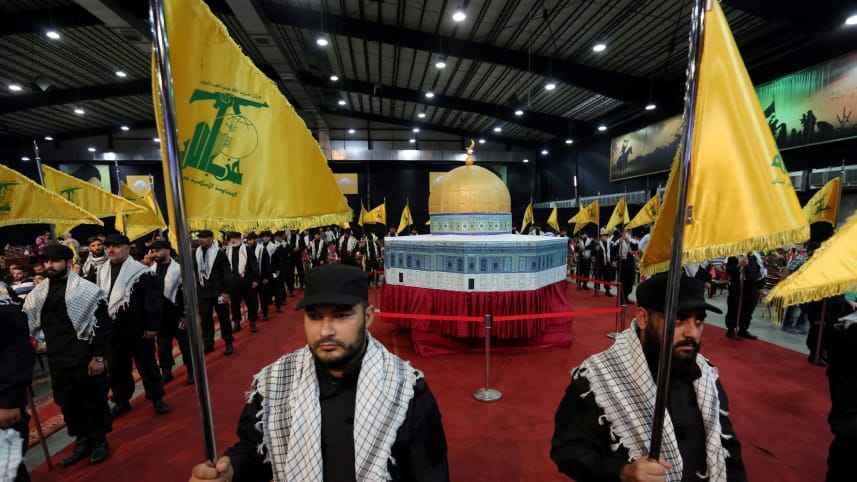Analysis/Hezbollah Caught Between Desire to Strengthen Iran and Need to Reinforce Its Domestic Power
زفي بارئيل من الهآرتس: حزب الله عالق بين رغبة في تقوية إيران وبين حاجته إلى تعزيز قوته المحلية
Zvi Bar’el/Haaretz/January 28/19
The group’s concept of ‘resistance,’ which is the foundation of its military existence, is subservient to political and diplomatic considerations if it wishes to help Syria and Iran
Lebanese Foreign Minister Gebran Bassil was asked in a recent interview on CNN whether the situation on the Israel-Lebanon border keeps him up at night.
“What’s keeping me awake at night is the silence that is accompanying the daily Israeli breaches of our independence and sovereignty… We have more than 150 air and land breaches of Resolution 1701 [which ended the Second Lebanon War]… If Israel wants to really assure its security, and that is its right, it should stop aggressing against other countries,” Bassil responded.
As expected, Bassil’s recognition of Israel’s right to defend itself sparked a huge storm in political circles and on social media – both of which reminded Bassil that he is meant to support the “resistance” and Hezbollah.
But Bassil, who heads the Free Patriotic Movement established by Lebanese President Michel Aoun, did not backtrack on his statement. His present concern is not with the public response, but rather international measures, including sanctions on Iran and the anti-Iranian conference called by Donald Trump that is slated to take place in Warsaw in February. This is a concern shared by Hezbollah, as these steps could impact Lebanon and Hezbollah’s standing in Lebanese politics.
Since Lebanon’s election in May, Beirut’s transitional government, headed by Saad Hariri, has failed to reach an agreement over the establishment of a new coalition. Therefore, it has been unable to make essential decisions regarding security and the economy.
The main obstacles faced by the transitional government have been the distribution of ministerial portfolios, which determine the distribution of power within the parliament. According to the Lebanese constitution, a two-thirds majority is necessary to pass votes on major issues. This means that any bloc with at least one-third (plus one) of the parliamentary seats has the power to defeat significant votes.
Hezbollah and its supporters have, in the past, held the one-third of seats necessary to block votes. Naturally, they want to retain this power. Hezbollah has stopped ministerial appointments and insists on adding a Sunni minister ally at the expense of the president’s quota or the prime minister – a demand that has been rejected by both leaders.
But last week, new voices from within Hezbollah seemed to be willing to allow Bassil’s movement to retain their veto power, which may finally presage an end to the political crisis. Hezbollah Secretary General Hassan Nasrallah believes that he can cooperate with Bassil, particularly because of the foreign minister’s intention to step away from the government’s and its prime minister’s declared policy and visit President Bashar Assad in Syria
Hezbollah does not need to publicly declare renewed ties between Syria and Lebanon to obtain weapons and logistical support. Israel, and not the diplomatic freeze with Syria, prevents Lebanon from operating a safe conduit for equipment and arms. But a lack of diplomatic dialogue between Syria and Lebanon is delaying the repatriation of about a million Syrians from Lebanon and strengthening the anti-Iranian position of Hezbollah’s opponents in the government.
Hezbollah is now caught between its desire to strengthen the status of Iran and Syria and the need to reinforce its domestic political power, which allows it to dictate the government’s position as it sees fit. But in the absence of a government, Hezbollah has no real leverage, and its insistence on dictating the government’s makeup also places it in the way of Lebanon overcoming its severe economic crisis.
Details that were released last week in the Hezbollah-affiliated daily Al-Akhbar about discussions of Lebanon’s High Defense Council, headed by the president, also attest to the military limits weighing on the government.
For example, the army’s commander, who is a council member, demanded instructions from the government on how to act in light of Israel’s breaches, especially regarding the defensive wall Israel is building along the border. The answer he received from the politicians was: “Get by with your forces in the area and we’ll discuss the response.” That is, do nothing.
Antoine Mansour, the Lebanese army intelligence chief, questioned the commotion over the wall, considering that a barbed-wire fence had already been in place to which Lebanon had not objected. “From now on they won’t see us and we won’t see them,” Mansour, who opposes a military response to Israeli breaches, reportedly told the council. “And in case of a response, the army won’t last more than 24 hours,” he added.
The prime minister has said that he is in favor of a military response, and any response must receive his approval and that of the president – not of the army, and certainly not Hezbollah, even though those two bodies would decide the nature of the response, if any.
Beyond recognizing the inability of the Lebanese army to face off against Israel, which is not new, it is clear that Hezbollah will have to restrain its response in order to avoid further complicating the formation of the government and the damage that an Israeli strike could cause Lebanon. It must also be very careful not to move Israeli military action from Syria to Lebanon.
Thus, even Hezbollah’s concept of “resistance,” which is the foundation of its military existence, is subservient to political and diplomatic considerations if it wishes to help Syria and Iran. However, these obligations are not set in stone. Their fabric depends on Israel’s intentions and its actions in Syria and Lebanon. Hezbollah is willing to give Lebanon the right to sleep peacefully as long as Israel does not keep it awake at night.






















